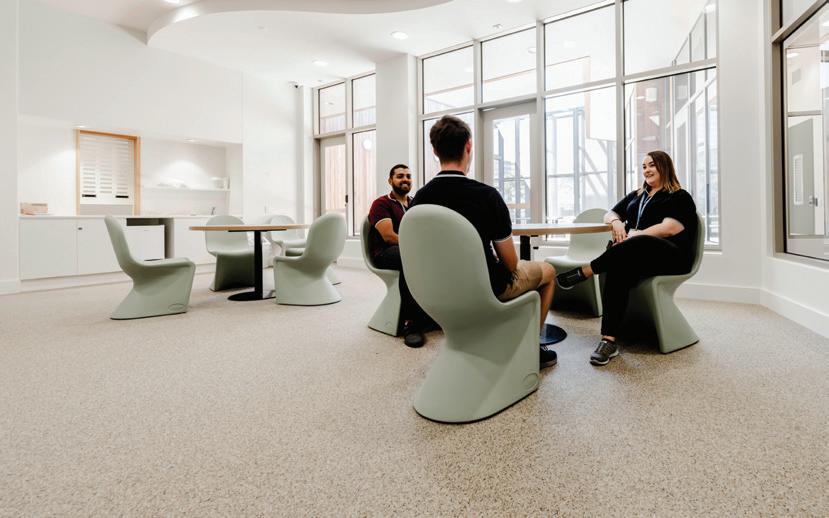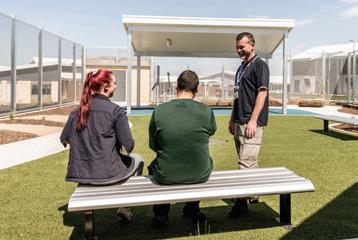
4 minute read
Bringing an occupational perspective to forensic mental health
Lorrae Mynard, Lead OT at Forensicare
Forensic mental health (FMH) services provide care to people experiencing mental illness who become involved with the criminal justice system (CroninDavis, 2017; Muñoz, 2019). Australian forensic occupational therapists work mostly in discipline-specific roles within low to high security and brief to extended stay settings, including prisons, secure hospitals, courts, and community services. Collaborations between justice and multidisciplinary health services are expanding in recognition that many people within this system experience mental ill health and/or disability and need specialised input, leading to recent significant growth in forensic occupational therapy services in several states. Occupational therapists provide interventions that consider the interactions between the person, occupation, and environment.
People receiving FMH services often have a diagnosis of mental illness, and may also experience substance misuse, personality disorder, intellectual or developmental disability and history of trauma. Level of educational attainment is often low and indigenous and minority populations are over-represented. The physical environment, often comprising hard surfaces and stark spaces with limited privacy and access to resources, is designed to contain and restrict. This impacts occupational participation: reducing opportunities for and personal choice of occupations. The social environment of correctional and health staff and other prisoners or forensic patients may be experienced as supportive or challenging. The institutional environment may include rigid routines which limit opportunities for person-therapist interactions; or uncertainty around release dates that affects continuity and completion of therapy.
Supporting people in FMH services
Occupational therapists work at individual, group, and service levels to promote opportunities for participation in meaningful occupation during incarceration/


admission and in preparation for release/ discharge. Input begins with building rapport, identifying interests and enabling social or activity-based interaction, and advocating for access to objects or opportunities such as magazines or puzzles for use during lockdown periods.
Occupational therapists assess participation and identify occupational needs, which often relate to identifying meaningful goals, building routine, strengthening roles, developing daily life and vocational skills. Supporting physical health is important as the restrictive environment and use of antipsychotic medications can lead to significant weight gain and development of metabolic syndrome.
Occupational therapists may modify the physical environment: installing clocks to support orientation to time or murals for visual interest, developing garden spaces or using blackboard paint on walls to allow chalk drawing. They work with people to identify sensory preferences and develop sensory plans and educate other staff about responding to sensory needs. Supporting people to transition toward lower security and community settings is crucial and occupational therapists often take a lead role in developing plans for graded community access. Opportunities and challenges have arisen in navigating NDIS processes to build partnerships with providers to improve service access and support continuity of care. In some services occupational therapists have an ongoing role with people living in the community under forensic legal orders.

Continued next page
Continued from previous page
References can be viewed by scanning the QR code

Building the evidence for occupational therapy in FMH
Aware of the risk of being drawn towards generic working or care coordination and losing their unique occupational focus, forensic occupational therapy teams across Australia are actively strengthening the occupational basis of their practice: articulating evidence-based pathways and practice processes, building clinical reasoning skills, implementing use of standardised occupational therapy assessments and/or structured occupational formulation approaches, and using evidence-based intervention resources. Demonstrating impact is critical, and many teams are conducting formal service evaluation, while some services have partnered with universities to conduct and publish research (e.g. Harris et al., 2020; Perkes et al., 2015; Taylor et al., 2021; Whiteford et al., 2020).
Leveraging the strength of collaboration, an Australasian Forensic Occupational Therapy Network (AFOTN) has been established to create opportunities for FMH occupational therapists across Australia, New Zealand, and Asia to “connect, support each other in conducting evidence-based practice, to promote the forensic specialty and advocate for the occupational needs of clients in forensic settings” (AFOTN, 2022). With legislative reviews leading to increased state-based funding for FMH services, occupational therapists have exciting opportunities to demonstrate and expand the impact of meaningful occupation in the lives of people experiencing mental health within the criminal justice system.
Learn more about occupational therapy in FMH
The AFOTN are partnering with OTA to deliver a forensic stream at the November 25 Mental Health Forum in Sydney.
Please contact the author (Lorrae.Mynard@forensicare.vic.gov. au) if you are interested in finding out more about the AFOTN. About the author Lorrae Mynard is passionate about keeping occupation at the heart of occupational therapy. Having worked in varied adult mental health settings in Australia, Canada and the UK, she is presently a lead occupational therapist at Forensicare in Melbourne, chairperson of the Australasian Forensic Occupational Therapy Network, and a doctoral candidate with Monash University. Her doctoral research is focused on occupational formulation; her other research focuses on occupational therapists’ experiences of working in solitary confinement, and experiences of forensic mental health consumers related to disclosure, time use, digital literacy and transitioning to community living.







